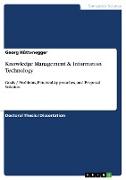Knowledge Management & Information Technology
BücherAngebote / Angebote:
Doctoral Thesis / Dissertation from the year 2004 in the subject Computer Science - Commercial Information Technology, grade: A, Vienna University of Technology, 120 entries in the bibliography, language: English, abstract: This thesis examines the relationship of Knowledge Management (KM) and Information Technology (IT) using a holistic view. The first chapter presents definitions of knowledge and KM, discusses related fields to KM and knowledge types, argues what KM activities can be supported by IT, examines areas of IT related to KM, defines the focus of this thesis, and presents interesting artifacts. As areas that require flexibility, creativity, and learning are especially in need of KM, this thesis concentrates on them. The next chapter analyzes the goals of KM, problems to be addressed by KM-systems, goals and problems of a university, problems of (existing) KM-systems, and the requirements of a KM-system that supports a KM initiative that addresses the mentioned problems and does not suffer from the described problems. Following the identification of requirements for KM-systems, chapter 3 discusses important preconditions and foundations for KM and KM-systems. As a "complete'' KM-system can only be part of a "complete'' and holistic KM initiative, this examination presents indispensable issues for such KM initiatives and discusses the importance and relevance of them. The next chapter presents three existing solutions (CYMANTIX.NET / Oracle / Lotus/IBM). Finally, the chapter examines to what extent the three solutions address the requirements identified and what is missing. The main chapter of this thesis describes the proposed IT solution in the context of a holistic KM initiative. It starts with a discussion of principles such as participatory design, etc. that have to be adhered to when designing, implementing, and introducing the proposed KM-system. Then, the proposed KM-system is presented consisting of three major building blocks, namely the central user interface, the virtual information pool, and automation as well as further aspects. Furthermore, the relationship of eLearning and KM with regard to the proposed KM-system is examined, implementation issues are discussed, and the chapter ends with an evaluation of the proposed solution. The concluding chapter summarizes this thesis and stresses the holistic point of view that is combined with proposing a "complete'' IT system supporting KM. It discusses the pros and cons of this approach evaluation results. Finally, it presents areas that need further research and what the future holds for KM.
Folgt in ca. 5 Arbeitstagen
